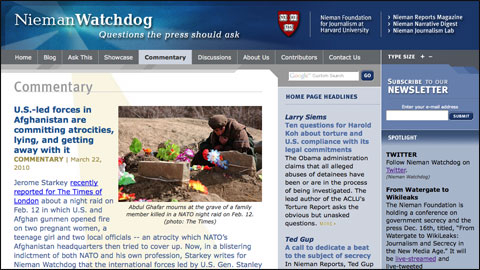Nieman Watchdog Project
The Nieman Watchdog Project is now in its seventh year online. The audience includes reporters and editors in mainstream media as well as bloggers and watchdogs publishing in new media. From week to week, Watchdog articles focus on public policy issues and the accountability of those in power. The site often encourages reporters to step beyond their comfort zone to pursue stories they and their editors might The site often asks reporters to broaden their horizons, encouraging them to pursue stories they and their editors might not ordinarily consider.not ordinarily consider.
In the past year, several of our stories had special impact. “U.S.-led forces in Afghanistan are committing atrocities, lying, and getting away with it” by reporter Jerome Starkey was written for us following a piece he did for The Times in London. Our piece drew attention in the United States and The New York Times then wrote about the situation. Consequently the United States and NATO took responsibility for the events depicted.

Consumer advocate Bruce Kushnick, a longtime contributor, wrote stunning pieces on how the big Telecoms dictate terms and the FCC tends to follow. His work on Watchdog, including these three pieces, has brought him considerable media attention.
Our contributors continue to write a lot about the war in Afghanistan. One piece I wrote, “New survey tells it like it is in Afghanistan: Primitive,” helps bring focus to something we don’t read enough about – what life is like for ordinary Afghani people.
We’ve had a number of pieces following up on our successful “Reporting the Collapse” series in 2009. Several have been written by Henry Banta and Martin Lobel, both attorneys in Washington, D.C., with experience as aides on Capitol Hill. All of their pieces are particularly instructive for reporters.
In “Reporting the Collapse,” Watchdog aired the view, held by some distinguished economists, that the press wasn’t investigating obvious financial misconduct at high levels. James Galbraith, for one, said in a Watchdog interview that the mortgage-related financial crash “was the product of wide-scale criminal fraud” and urged the press to treat it as a crime story. Such assertions were seldom made or looked into by the news media at the time but now they appear prescient—and make for headline news.
One result of the “Collapse” series was that Nieman Foundation curator Bob Giles and I were asked to write the concluding chapter for a forthcoming book, “Bad News: How America’s Business Press Missed the Story of the Century.”
A young reporter, Russ Choma did several pieces on our “Broken Congress” series including his article “Congress may not be broken but oversight is.” Choma was the winner of the 2009 graduate journalism student essay contest run in conjunction with the Nieman Foundation’s I.F. Stone Medal for Journalistic Independence.
We ran a number of pieces this year calling attention to great journalism in our Showcase section. “(Un) Covering the Death Squads in El Salvador,” by Craig Pyes, recalls bold reporting he and another reporter did in Guatemala 30 years ago as they courageously went into the lair of death squad leaders.
Watchdog continues to post a number of pieces on the criminal justice system. “A potent question to ask about your local prisons and jails,” by Dan Froomkin is a story that can easily be replicated by news organizations everywhere. A second piece on the criminal justice system, After a three-decade-long social experiment in incarceration, what do we have to show for it?, examined the fact that the United States now has a larger share of its population behind bars than any other country in the world. Two researchers posed important questions about what that has accomplished.
Nieman Fellows are valuable contributors to the site. 1967 Nieman Fellow Phil Meyer wrote a couple of pieces for us including “Will Americans get to like it in the Third World?” 1964 Nieman Fellow Morton Mintz continues to be a regular contributor. A goal in the coming year is to have more Nieman Fellows write for the site.
Watchdog relies on many other well-informed, insightful contributors. We are doing more cross-posting than in the past, giving readers access to incisive writers such as military affairs columnist George Wilson, environmental expert Bill McKibben, and others. Because Watchdog articles are often cited in the traditional press and linked to by bloggers, its contributors are frequently contacted by reporters seeking fresh perspectives.
The site also continues to cover the run-up to the Iraq war, an era in which almost all the U.S. press, including elite news organizations, acted irresponsibly by failing to report key information and question the government. The poor coverage of that momentous time—and its many ramifications – are stories that are still relevant today.
– Barry Sussman
Editor, Nieman Watchdog
Dan Froomkin, a Washington correspondent for The Huffington Post, is deputy editor of Nieman Watchdog.